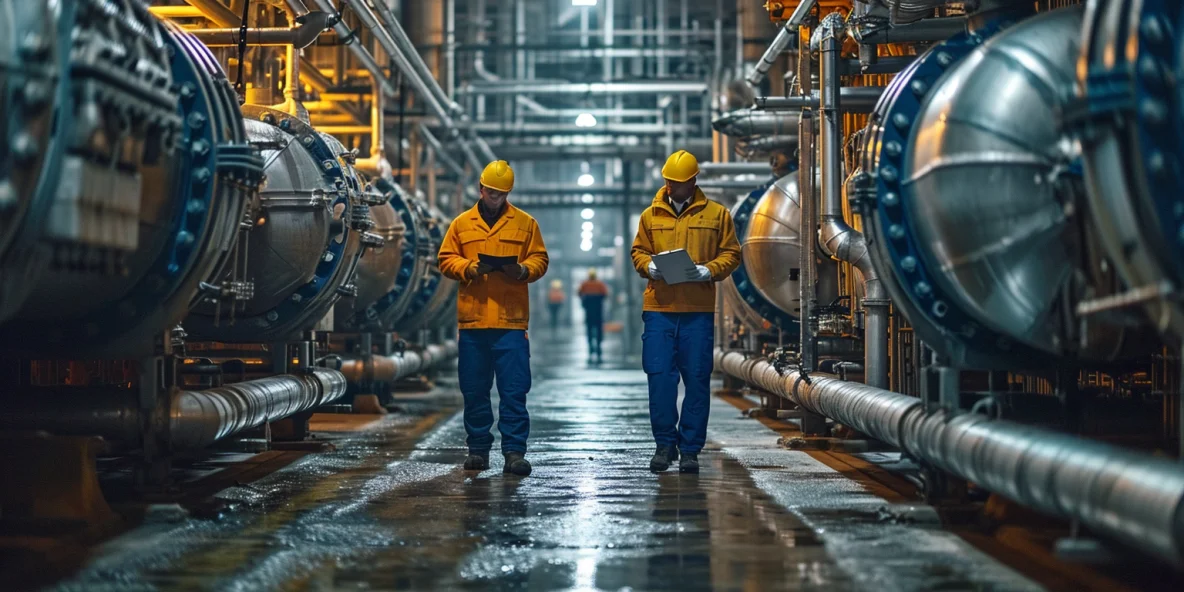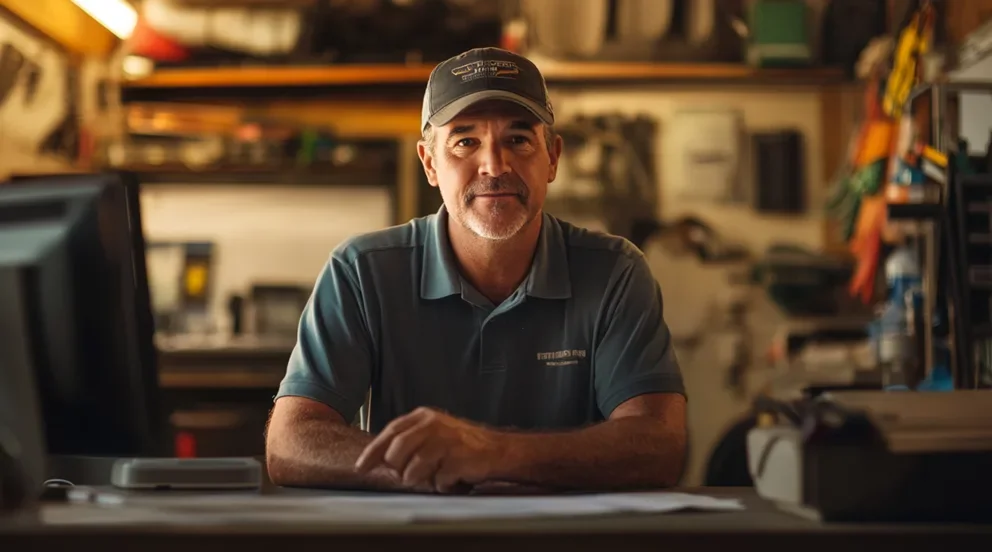Industrial HVAC (Heating, Ventilation, and Air Conditioning) maintenance refers to the regular check-ups and repairs necessary to keep industrial HVAC systems running efficiently. These comprehensive systems are designed to manage temperatures and air quality in large-scale facilities like factories, warehouses, and power plants. Maintenance includes inspecting equipment, cleaning components, and replacing parts that have suffered wear and tear over time.
Proper maintenance is crucial for ensuring system longevity, energy efficiency, and consistent indoor comfort. It also helps to prevent unplanned downtime by identifying potential issues before they lead to system failures. Industrial HVAC maintenance is typically carried out by professional technicians skilled in working with complex and large-scale systems. These technicians must adhere to safety standards and regulatory requirements while performing maintenance activities.
Without regular maintenance, industrial HVAC systems may experience reduced performance, higher energy consumption, and an increased likelihood of breakdowns. The impact of neglect can extend beyond discomfort; it can compromise product integrity in industries that rely on strict climate control, like pharmaceuticals or food processing. Therefore, industrial HVAC maintenance is a non-negotiable aspect of facility management.
Every sprawling production floor and towering warehouse owes a silent nod to the unsung hero of industrial efficiency: the HVAC system. It’s not merely a matter of comfort, but a critical component that affects productivity, safety, and operational costs. This article plunges into the intricacies of industrial HVAC maintenance, revealing why it’s a pivotal chapter in the narrative of industry operations.
Our investigation will navigate through the bustling corridors of preventive check-ups and the meticulous nature of emergency repairs. We’ll dissect the vital organs of HVAC systems, emphasizing the importance of regular maintenance schedules, and showcasing the role of skilled technicians who ensure these mechanical behemoths continue to breathe life into industrial spaces.
In this content, the spotlight shines on the best practices that keep the wheels of industry turning smoothly. We’ll explore the long-term cost savings versus the risks of neglecting maintenance, how technology is transforming maintenance protocols, and why staying ahead of HVAC maintenance isn’t just smart business—it’s an absolute necessity for modern industry.
Breathing Easy: The Crucial Role of HVAC Maintenance in Industrial Environments
In industrial settings, HVAC systems are vital for maintaining air quality and temperature. Their continuous operation is paramount, but often overlooked. Regular maintenance ensures systems run efficiently and effectively. Without it, air quality can degrade leading to potential health risks for employees. It’s about more than just comfort; it’s about creating a safe working environment, free from airborne contaminants and extreme temperatures which can impact health and productivity.
A robust HVAC maintenance plan can prevent costly breakdowns. Preventive care includes filter changes, duct inspections, and refrigerant level checks. These actions extend the life of the equipment, maximizing the investment. By identifying issues early on, businesses can avoid the sudden halts in production that accompany heating or cooling failures. This proactive approach not only saves money but also contributes to a more sustainable operation.
The expertise of maintenance personnel plays a critical role in this process. Specialists trained to handle industrial equipment can detect nuances that might elude others. Understanding the specific demands of diverse industrial environments is key to developing a tailored maintenance program. Such programs must adhere to strict schedules, incorporating regular assessments and part replacements when necessary.
Worker comfort is directly linked to performance and productivity. Maintaining an optimal temperature and humidity level keeps workers alert and can reduce the incidence of errors. Additionally, well-maintained HVAC units regulate airflow, which is particularly important in industries where fumes or dust are generated. This contributes to better health outcomes and a more agreeable work atmosphere.
Ultimately, the longevity of an HVAC system in an industrial context depends on regular upkeep. Efficiency decreases as systems age, but routine maintenance can slow this process. By investing in the well-being of infrastructure, industries guarantee themselves a more reliable production cycle. The benefits of such care extend beyond immediate cost savings, influencing the overall well-being of the workforce and the environment.
The Unsung Heroes of Industry: How Regular HVAC Maintenance Keeps Facilities Running Smoothly
HVAC systems in industrial facilities are paramount to operational efficiency. Regular maintenance is the unsung hero that keeps these systems in optimal condition. Skilled professionals regularly check and service these systems to prevent catastrophic failures. This ensures a facility’s operation never falters due to HVAC issues. Regular maintenance also helps to diagnose problems before they become severe, contributing significantly to smooth operations.
Scheduled maintenance sessions are not only about preventing system failures. These sessions improve energy efficiency, reducing the carbon footprint of the facility. Filters clean the air of particulates that could otherwise harm machinery and health. In this way, regular servicing not only minimizes disruptions but also contributes positively to the environment. This is a testament to its importance in the industrial sector.
The consistency of HVAC maintenance can increase the lifespan of the equipment. An HVAC system without regular upkeep is prone to breakdowns, which often lead to expensive replacements. Additionally, the disruption in environmental conditions can impact sensitive machinery and production processes. Investing in routine maintenance thus becomes both a cost-effective and prudent decision over the long term.
When machines operate without hiccups, worker morale and productivity rise. A well-maintained HVAC system ensures that the industrial environment remains conducive to work. Comfortable temperatures and good air quality help to maintain a focused and efficient workforce. In turn, this fosters a workplace culture that values well-being and sustainability, emphasizing the importance of maintaining critical infrastructure.
HVAC maintenance may not always be at the forefront of industrial priorities, but its impact is undeniable. Regular maintenance checks are the building blocks of a facility’s resilience. This proactive approach to maintenance is integral to the seamless performance of industrial facilities. It enables businesses to thrive, providing a firm foundation for production and employee satisfaction alike.
Climate Control: The Impact of HVAC Maintenance on Industrial Productivity and Worker Comfort
A stable climate is essential in industrial spaces where temperature-sensitive processes are pivotal. Recognizing this, the role of HVAC maintenance becomes indisputable in sustaining productivity. Frequent service adjustments ensure that machines operate within specified thermal conditions, preventing malfunctions due to overheating or undercooling. Thus, routine maintenance is not just about preserving equipment—it’s also about safeguarding production timelines.
Worker comfort directly influences their capacity to work effectively. It’s known that uncomfortable temperature ranges can diminish concentration and output. This is why properly maintained HVAC systems, which regulate air quality and temperature, are critical. By ensuring a pleasant work environment, industries can bolster productivity. Happy employees are synonymous with high-performing facilities, reinforcing the importance of optimal climate control.
The cost-efficiency of regular HVAC maintenance is staggeringly clear in the long run. When industrial units function at peak efficiency, energy consumption is minimized. Moreover, the expenses linked to emergency repairs and downtime are significantly reduced. Investing in periodic maintenance is far less expensive than financing the repercussions of an HVAC system failure. Therefore, maintenance should be a cornerstone of financial planning in industrial operations.
HVAC systems also dictate the air quality within a facility. Proper ventilation reduces the accumulation of hazardous materials in the air. By ensuring pollutants are efficiently expelled, HVAC maintenance contributes to a healthier workplace. This commitment to a safe working environment can reduce health-related absences, further amplifying productivity. It’s an often underestimated aspect of industrial success, yet it holds immense value.
In conclusion, HVAC maintenance forms the backbone of industrial productivity and worker comfort. Regular checks can predict and prevent potential malfunctions, yielding uninterrupted operations. Maintenance personnel are vital to this process, guaranteeing the smooth functioning of complex climate control systems. Ultimately, the correlation between maintained HVAC units and industrial success is profound, with undeniable benefits spanning cost savings, safety, and operational efficiency.
Clearing the Air: Maintenance Strategies for Industrial HVAC Longevity and Efficiency
Ensuring the longevity and efficiency of industrial HVAC systems hinges on strategic maintenance. Preventive measures like cleaning components and checking for wear actively prolong the unit’s life. A well-maintained HVAC system diminishes the need for frequent repairs, fostering a cycle of reliability and performance. Companies that strategize on HVAC care can significantly reduce their operational costs over time.
Yet, proper maintenance isn’t just about system longevity; it crucially affects energy efficiency. When HVAC systems are kept in prime condition, they function seamlessly, requiring less power to operate. This can translate into considerable energy savings, a benefit that not only affects finances but also the environment. By using less energy, industries contribute to a lower carbon footprint, aligning their operations with sustainability goals.
An effective HVAC maintenance strategy involves scheduling services before peak seasons. Preemptively addressing potential issues prevents sudden breakdowns during periods of high demand. A systematic approach to maintenance ensures that every part of the system, from compressors to thermostats, operates cohesively. This methodical process ultimately results in uninterrupted productivity and a stable industrial climate.
Technological advancements can also aid in HVAC maintenance by providing diagnostic tools for early problem detection. Using smart sensors and predictive analysis, maintenance teams can address issues before they become detrimental. By integrating technology into maintenance practices, industries can enjoy a modern, efficient approach to preserving their HVAC systems. The fusion of traditional maintenance with innovative tech leads to even more robust strategies.
In all, maintenance strategies are pivotal for the health of industrial HVAC systems. Regular, planned maintenance curbs unnecessary wear and energy waste, directly affecting cost and operational effectiveness. Conscientious care preserves system integrity, ensuring a breathable and comfortable industrial environment. This ultimately results in an industrial setting that thrives on consistency and foresight.
Behind the Scenes of Industrial Success: The Importance of Proactive HVAC Maintenance
The foundation of any successful industrial operation often includes a proactive HVAC maintenance program. This program ensures the functionality and reliability of a facility’s heating, cooling, and air filtration systems. By preemptively addressing potential issues, industries avoid significant interruptions in production. Adopting a proactive stance in HVAC maintenance is, therefore, a contributing factor to a company’s overall success.
Key to proactive maintenance is understanding the intricacies of industrial HVAC systems. These systems are complex and require a sophisticated approach to care. Customized maintenance schedules allow for the specific demands of different industrial environments. By catering to the unique needs of each facility, effectiveness and efficiency are maximized. Tailoring maintenance routines is hence an essential component of preemptive system care.
Avoiding downtime is another critical benefit of regular HVAC maintenance. In industries where production processes never sleep, the cost of unscheduled downtime can be exorbitant. By keeping HVAC systems in optimum condition, the likelihood of unexpected failures is drastically reduced. Proactive maintenance, therefore, becomes a cost-saving measure as much as a technical necessity.
Moreover, proactive maintenance takes worker well-being into account. By ensuring that industrial HVAC systems are regularly cleaned and serviced, industries contribute to a healthier work environment. This has a two-fold benefit: it protects workers from potential health issues and upholds productivity standards. The consideration of employee health and comfort as a priority underlines the far-reaching impact of a proactive HVAC maintenance approach.
Ultimately, successful industrial operations regularly invest in proactive HVAC maintenance to avoid pitfalls. By scheduling timely maintenance, industries safeguard their operations against unexpected system failures. Proactive approaches also contribute to a cleaner, healthier work environment, which is crucial for safeguarding worker well-being. It becomes apparent that behind every successful industry, there lies a diligent and anticipatory approach to HVAC maintenance.



